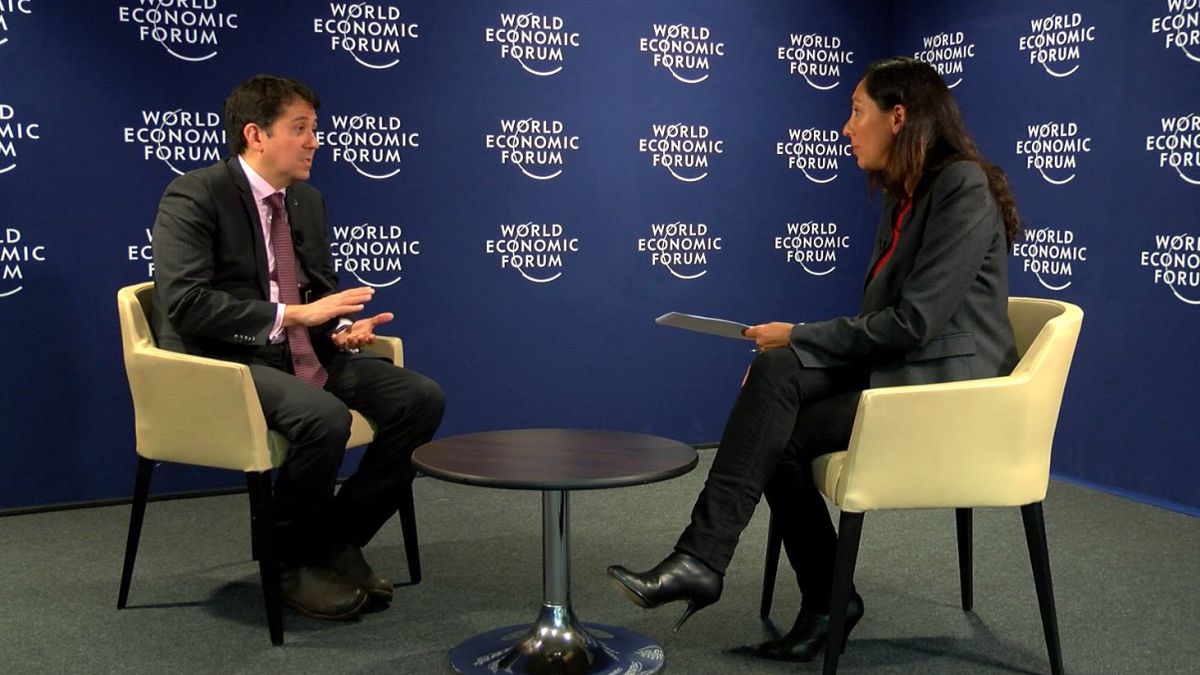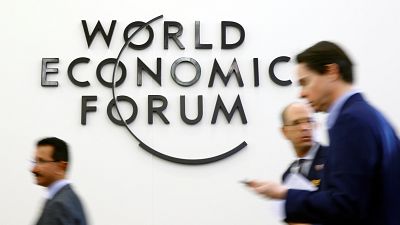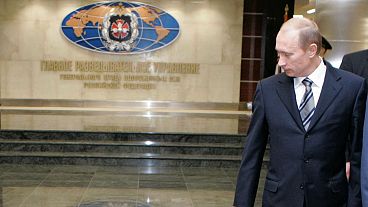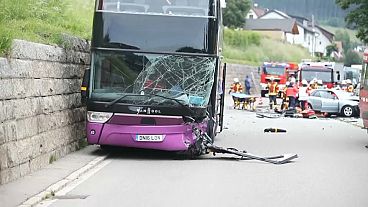The head of the World Economic Forum tells Euronews' Isabelle Kumar his vision for a post-recession economy.
There is a blockbuster guest list of political and business leaders in Davos this year. The global elite are meeting amid the good news of strong global growth figures but also warnings of the many multiple challenges that face them.
Synchronised global growth forecasts are putting a smile on many a delegates’ face.
Risk of a renewed recession are predicted to remain low as economies finally complete the slow bounce back from a downturn that began ten years ago.
The IMF has predicted a new global growth rate of 3.9 % for 2018 and according to some experts only 4 global economies are expected to contract.
Nariman Behravesh, the Chief Economist at IHS Inc said: “I think left to its own devices the global economy is going to do well. The issue is a policy mistake from my perspective, whether it is protectionism on the part of the US, or central banks getting spooked and stepping on the breaks too hard, or China mismanaging its deleveraging – its debt problem.
“Those things could get in the way. Otherwise this economy can easily go at the rate its been going for another year, maybe two years.”
This rosy picture could herald a rise in wages, further drops in unemployment and make some of the enduring the bugbears of the financial crisis more manageable – bad bank loans and budget deficits being notable examples.
While investors may be rubbing their hands with glee – a note of caution.
The dark clouds of geopolitical instability are gathering amid worries of new wars that could rapidly put paid to this bright spell of economic optimism and growth.
In what is a rapidly changing and turbulent world, The World Economic Forum is looking to new models to help drive sustained economic progress. To find out more Euronews met with Lee Howell, Managing Director of the World Economic Forum.
*We’ve got a positive economic picture at the moment but also some key challenges that have to be tackled globally.
Run us through those in a nutshell.*
01.55 A. Lee Howell
In a nutshell, it seems to be that growth is coming back at least to levels seen before the great financial crisis and there are a number of people who’ve been out on the record, particularly, for example, the Managing Director of the IMF Christine Lagarde who’s said, “look, it’s when it’s sunny that you should fix the leaky roof”.
What we mean by the structure pieces, I think, are clearly this notion of having more growth that’s inclusive and sustainable.
And I think that wasn’t in the narrative of the past. Inclusive means it is not just the GDP growth rate but really whether we are affecting the household incomes in order to bring more people into the middle class.
And secondly, the sustainability part, I think, as we all know with the climate, is how we make sure that we don’t create more externalities. I mean, how do you actually keep the the planet under the two degrees ceiling. So, that’s daunting and requires structural changes and it’s not a cyclical thing.
The WEF is looking at new models to try and have this sustained economic growth which is sustainable as you were saying. Can you explain how these models would work?
Well, I think the simplest way to understand models is really, you can’t principally manage what you don’t measure, right?
So you have to start changing the measurements of success. So things that, in general, if your goal was purely the GDP growth, do you start talk about the creation new jobs in that context? So you have to start changing the indicators, for one, and I think we now know that income disparities are clear concern and it’s a structural challenge, right?
And there are many ways look at it but still you have to put that as a measurement so let’s look how we can move the needle.
Much to the same point, you know, if you think about gender. Gender in sort of parity and pay but also participation economy, if you don’t start to measure that you won’t be able to see is there is progress but you have to have that conversation about what you really want to measure and towards what end.
*You mention inequality, but if we look at the growth figures this year, there are also some major risks out there. What would be your top three risks that could bring the economy tumbling back down?
Well, of the three risks, the one that we need to really re-orientate ourselves on is the geopolitical risks. I mean, all of [these forecasts] are premised in peace and stability that allows you to have prosperity and growth but, you know, in this day and age we can’t count on that.
We learn every day about the potential threats related to proliferation of nuclear weapons, we have conflicts simmering all around the world which could actually bring into play even the greatest powers in the region, so, i think the geopolitical part is very real and I think it would actually not defeat our recovery. The second part i would say, I do think it has to be again this growth that leads to jobs in a sense that people are part of this middle class.Because the second piece is really a political backlash, not necessarily a geopolitical one but people have a say in most economies.
Most economies, you know, you cover or are familiar with are places where the voters can change economic policy. And the third, of course, is the protectionism piece. I think there is a real need to address those who have actually had to bear the brunt of the structural adjustments toward freer and more open trade. But at the same time, we have to be careful about what you untangle, which could actually have unintended consequences.
What about in Davos then? What would you like to be achieved in Davos this year? You have an amazing guest list, so what would you like to come out with?
05.36 A: Well, I think first and foremost, you know, the theme is a shared vision in a fractured world. I think we should be forthright about where those fractures are – some are political, geopolitical – and acknowledge that we need to do something about it. In a way, we can’t talk about the prescription without having the honest diagnosis. So, I think, to answer your question: one, let’s make sure everybody is heard in terms of what they think the state of the world is, so we get a clear diagnosis here; second is to start thinking about where are the opportunities and, to your earlier point, where is the structure work needed to be done now.
Now, what I mean by that is, it’s like planting trees. If you want to prepare a work force that’s all about this fourth industrial revolution, it doesn’t necessarily start with me, it’s really my children and really understanding what are the skill sets they need now and how you make sure that the employment system matches up at least with the education system’s remit today. So it’s those sorts of things, and it requires a lot of conversation.
So you go from that interest to some purpose, and then, I guess, fundamentally, to all leaders – they’ll take some action in there own way. I think the first thing is to make sure that they are in that learning, listening mode. An because I’m confident, as they are leaders of their institutions that they’ll go into the action mode with that information.



